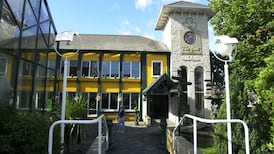IAWS chief executive Mr Owen Killian was in characteristically low-key form this week. Never one to seek the limelight, he was keen to take attention away from himself when discussing the running of the €1.4 billion food and agribusiness group
Furthermore, he made the firm's latest acquisition - of Groupe Hubert in France for €130 million - sound like the easiest thing in the world.
And maybe this is true. After all, IAWS is by now an old hand at buying and developing food interests around the world. Seven years on from its £51 million (€65 million) acquisition of Cuisine de France, the firm continues to display the golden touch when it comes to strategy.
Mr Killian, however, will politely decline to take the credit, placing the laurels on his predecessor, Mr Philip Lynch, instead.
To understand the Groupe Hubert deal, Mr Killian says it is important to look back to 1997 and, you've guessed it, Cuisine de France.
"Before Cuisine de France, we couldn't have done it," he says.
The emphasis on the Cuisine deal is natural and well-founded, since the 1997 deal set IAWS on a new track that has provided it with success after success.
Traditionally known as an agribusiness group, the firm now takes almost three-quarters of its operating profits from food and the measure is considered likely to widen in the future.
This breakdown is particularly noteworthy given that just six or so years ago, operating profits would have been about 85 per cent drawn from agribusiness.
Since then, however, the firm has bought food-service firms Délice de France for €52 million and Pierre's for €26 million. In 2001, it unveiled a joint-venture bakery with Tim Hortons in Canada, which involved an initial investment of €75 million and a projected outlet of €225 million by the two parties.
A few months later, the group expanded into California with the acquisition of 80 per cent of artisan baker La Brea for €64 million. Meanwhile, the firm's Shamrock Foods subsidiary continues to draw solid profits from brands such as Roma pasta.
It's all a long way from fertiliser and fish meal, regardless of your perspective.
Mr Killian, who has worked with IAWS for 28 years, starting in its seeds department, is careful when discussing the future of the firm's agribusiness interests.
He says the firm will remain committed to the sector "for as long as agribusiness remains relevant to the market in which it operates".
He points out that varied interests in the area continue to "throw off" €25-€30 million in free cash every year, cash which has been more than useful throughout the recent food expansionary phase.
"We haven't had recourse to shareholders since 1990," says Mr Killian.
He is reluctant, however, to share his views on how decoupling (the separation of EU premiums from production) will affect these businesses, aside from suggesting that it could in fact see more, rather than less, production.
In the meantime, IAWS is taking no chances on its food operations. It will be investing €30-€40 million in development this year, with most of this to go on the construction of a new bakery plant in the US state of New Jersey.
Mr Killian says the preferred option for IAWS will always be organic growth, even though history shows the firm will rarely pass on a sound acquisition opportunity.
"Acquisition has got to be very strategic now," he says.
The Groupe Hubert deal has been welcomed by both analysts and investors, with the IAWS share price rising steadily since the announcement - at least until yesterday.
The justification for this seems clear - the move brings IAWS into the second-biggest European bakery market for the first time and gives it control of a successful, long-standing company.
Mr Killian suggests that such positive reaction is due more to the market understanding the firm's model than to the actual detail of the deal.
Groupe Hubert, with its Coup de Pates brand, has been running with its current business model for the past quarter of a century and now has 20,000 customers.
Mr Killian says it would have been hard to find a company that was so suited to IAWS's development needs as Groupe Hubert at exactly the time when it could afford the deal.
IAWS has been "watching" the firm for the past few years, waiting for its venture-capital owners to cash in their chips.
One side benefit of the purchase will be the "cross-fertilisation" it can bring to other IAWS business. The group is still a relative novice at this on the food side, but has recently realised some success through the introduction of La Brea bread in Ireland.
Mr Killian, who has been at the forefront of acquisitions for many years now, says Groupe Hubert was not the most difficult deal to complete. This was because the target firm was well managed and did not present any nasty complications on trading side.
His team's experience in completing such purchases was a lesser factor, he suggests, since each deal is different.
"There is no book you can pull down off the shelf to tell you how to do it," he says.
Perhaps he should think of writing one?










